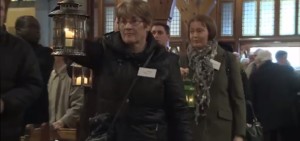
By Sarah Mac Donald - 08 December, 2014
 “We are living in a spiritual wilderness of sorts” Bishop Brendan Leahy admitted as he convoked the Irish church’s first diocesan synod in half a century.
“We are living in a spiritual wilderness of sorts” Bishop Brendan Leahy admitted as he convoked the Irish church’s first diocesan synod in half a century.
Acknowledging that the Irish Church has been through “difficult and confusing times” he said that there had been many cultural and social changes in recent years and that the shape of the Church’s structures are in transition.
He was speaking on Sunday in St John’s Cathedral in Limerick city where over 300 delegates elected to represent the diocese at the three-day synod meeting in spring 2016 had gathered from across the city and county.
Bishop Leahy commented to them, “We’ve seen internal divisions among us and we know that young people often don’t find what they are looking for in the Church as we present it today.”
Referring to the impact of the abuse scandals, the Bishop said the Church “has been rocked” and “stumbled badly” in recent years.
Though the church had stumbled, the bishop said, it had not fallen. “While the Church reeled, faith remained precious,” Bishop Leahy commented.
Underlining that “The Church is in need of repair”, he said and added that it would only be regenerated if it is more inclusive and if clergy and laity work together.
He urged the people of Limerick to “reimagine and re-arrange” the church’s future not as it was before but with “something that fits the present day.”
This, Dr Leahy suggested, means being bold and creative in rethinking the goals, structures, style and methods of evangelisation of Limerick’s diocesan community.
The Synod will set out a blueprint for the many challenges the diocese of limerick faces going forward.
 He appealed to everyone in the diocese to get involved as the synod would be a moment to draw up new plans for the diocese so that it is ready for “what I believe can be a new dawn breaking for the Church, a dawn we will all greet together.”
He appealed to everyone in the diocese to get involved as the synod would be a moment to draw up new plans for the diocese so that it is ready for “what I believe can be a new dawn breaking for the Church, a dawn we will all greet together.”
“The Church of tomorrow must be inclusive, regenerated by us all together, clergy and laity; those of great faith and those of challenged faith, working hand in hand to create a refreshed space where the windows are open and new air breathes in.”
Through the Synod, the church was being offered an opportunity to build up the future. “Let’s not miss this appointment with history,” Dr Leahy appealed.
Pope Francis, he underlined, would be the guiding architect for their synodal journey.
“Our Diocesan Synod is to be a time when we clearly commit ourselves again to do our part to prepare the way for Jesus to come again in a new way among us at all levels of Church and indeed in society,” he explained.
Addressing delegates, he said, “There will be many paths to be made straight – paths of wounded hearts; paths of confused minds; paths of disappointed spirits, paths of rejected outreach.”
In his decree of convocation, Bishop Leahy said he was mindful of Pope Francis’ call for ‘a pastoral and missionary conversion which cannot leave things as they presently are’.
“John the Baptist was a man of hope, believing in a better future and in the work of the Holy Spirit. So there’s no need to be afraid or downhearted about the future. As Pope Francis puts it, let’s not say our times are harder than previous times; they are just different.”
He added, “We owe this to future generations and to the wider society that we want to serve.”
As the delegates to the Synod were commissioned, they declared publicly their intention to live their Baptismal vocation with renewed faith, hope and love. They also promised to love one another as Jesus has taught.
Bishop Leahy appealed to all in the cathedral to join with them as they made this commitment, promising to share each other’s joys and sufferings, “giving our lives out of love for one another. We can take it as a form of pact that binds us together in a new way preparing the way of the Lord who is coming to dwell among us anew.”
[youtube http://www.youtube.com/watch?v=w0uxwVKAg3M]